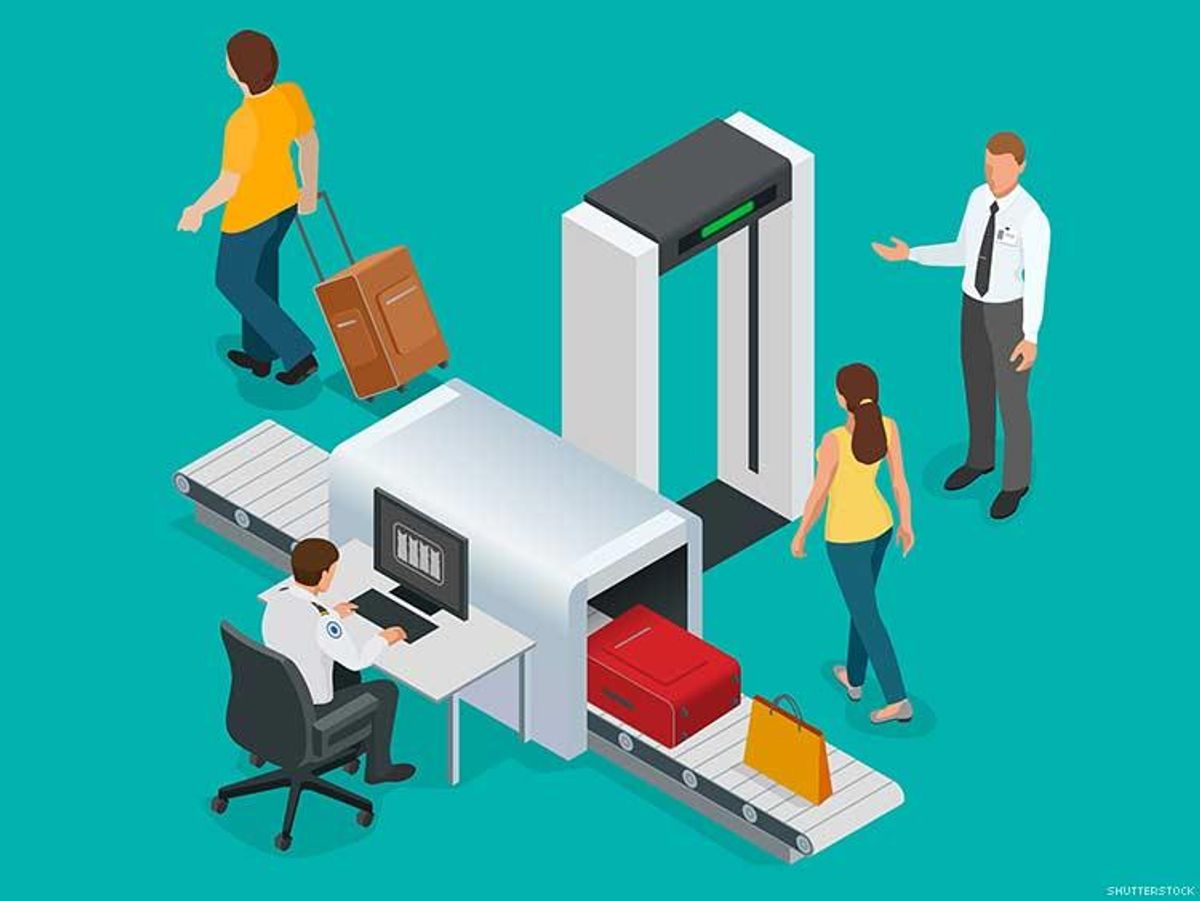The U.S. Transportation Security Administration has finalized a new rule that the National LGBTQ Task Force says "codifies discrimination against transgender people."
Under the rule, the TSA maintains widespread use of body-scanning technology that requires TSA agents in airports to identify passengers by their perceived gender, choosing a pink or a blue button, according to a press release sent by the Task Force Friday afternoon. This means that transgender and gender-nonconforming people will often be subject to intrusive examinations, such as pat-downs and inspection of their chests and genital areas.
The TSA was ordered to review its use of full-body scanners by an appeals court five years ago because the agency acted without formal rules or public comment, notes a coalition of LGBT rights groups that includes the National Center for Transgender Equality, Lambda Legal, and the American Civil Liberties Union's LGBT & HIV Project. With the finalization of the policy, the TSA will make no changes, which is bad news for transgender travelers, the groups said in a joint statement.
The TSA has received much criticism in the past year for its treatment of transgender travelers. One trans woman, Shadi Petosky, came forward with a story of undergoing humiliating examinations at Orlando, Fla.'s airport because of a perceived "anomaly" in her anatomy and was delayed so long that she missed her flight. Several other trans people have told of similar treatment, although some have reported more positive experiences.
Numerous civil rights groups met with the TSA and called on the agency to change its policies. The TSA did announce in December that it would no longer use the word "anomaly" in calling attention to discrepancies between a traveler's anatomy and appearance, substituting "alarm," but some activists said that was no improvement. Friday's announcement brought further critique, although the TSA issued a statement asserting the agency will treat transgender passengers with "respect and courtesy."
Critics, though, say trans travelers have reason to be concerned. "Transgender people are regularly harassed and humiliated by current screening procedures, which treats transgender people's bodies as 'alarms' and thus subjecting them to physical and emotional mistreatment," said Victoria Rodriguez-Roldan, the Task Force's trans/gender-nonconforming justice project director, in Friday's press release. "Current policies create a situation where transgender people are dehumanized and placed in harm's way by constantly outing them and forcing them to disclose their personal lives with TSA agents in front of everyone in order to travel by airplane."
"TSA needs to institute screening algorithms in their scanners that are universal instead of relying on stereotypical notions of what a person of one gender or another must look like," Rodriguez-Roldan continued. "We will continue pushing TSA to implement policies that ensures the dignity, safety, and respect of each traveler, including transgender people."
The Task Force has also suggested that the TSA adopt technology that can distinguish between body parts and foreign objects. "While we understand implementing the scanning technology update may take some time and more investment in much-needed innovation, in the meantime, TSA needs to develop transgender-inclusive and sensitive policies that don't subject transgender people to further invasions of privacy and humiliation by being outed (which places them at risk of further discriminatory treatment), and groin area pat-downs," Task Force executive director wrote in an Advocate commentary in December.
Added NCTE executive director Mara Keisling: "It is completely unacceptable to require Americans to discuss their genitals with uniformed government officials in order to travel by air. But that's exactly what the body scanner program means for many transgender people. TSA has ignored the public's very real concerns about the efficacy and the real harms of this technology. TSA is spending billions on security theater that seems to do little but erode all travelers' privacy and dignity."
"We urge President Obama and Secretary of Homeland Security Jeh Johnson to take action to finally restore balance to airport security," said NCTE policy director Harper Jean Tobin. "Today's system exacts a high cost in dollars and personal privacy, with no proof that it is working. These scanners can't even tell the difference between a bomb and a traveler's own body. The American people deserve better."
A TSA spokesman responded to The Advocate's request for comment with the following statement: "TSA officers are trained to properly screen members of the transgender community. TSA recognizes the concerns that some members of the transgender community may have with certain security screening procedures at the nation's security checkpoints. TSA is committed to ensuring all travelers are treated with respect and courtesy and is continuing to enhance training efforts in response to concerns raised by the transgender community."


















































































Viral post saying Republicans 'have two daddies now' has MAGA hot and bothered